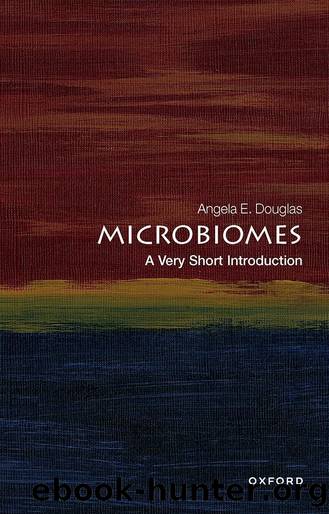Microbiomes by Angela E. Douglas

Author:Angela E. Douglas [Douglas, Angela E.]
Language: eng
Format: epub
ISBN: 9780192643841
Publisher: OUP Oxford
Published: 2022-09-13T00:00:00+00:00
The gut microbiome can also affect behaviour through its influence on nutrition and metabolism. One route that is mechanistically trivial but behaviourally important concerns microorganisms which provide essential nutrients. Shortfall of a nutrient, whether arising from dietary or microbial deficiency, induces a specific hunger for that nutrient, leading to increased foraging behaviour and often increased feeding or a shift in food choice. Other effects are mechanistically less obvious. For example, the presence and composition of the gut microbiome influence how much time Drosophila flies spend moving, and this is mediated by microbial effects on blood sugar levels, which in turn influence the activity of specific neurons in the fly brain that drive locomotion.
Finally, there is a very special route by which the gut microbiome can influence the brain of mammals: certain products of gut microorganisms can cross the placenta of pregnant females, affecting the development of the brain of the foetus and, ultimately, the behaviour of the offspring after birth. Much of the evidence derives from the detailed studies of the brain in germ-free mice, in which many neural circuits in the brain are altered. The anatomical perturbations are especially pronounced for the thalamus, a region deep in the brain which, as mentioned previously, relays sensory information to the brain cortex, where many behavioural decisions are made. These abnormal connections are laid down in the developing foetus of germ-free mothers; after the offspring are born, they display lifelong problems in sensing touch, even if they are provided with gut microbes. Experimental studies have shown that these anatomical and behavioural lesions are abolished when the mother is administered bacteria of one particular group, the clostridia. The clostridia release several small molecules that pass into the bloodstream, and across the placenta to the foetus. How these molecules influence neuronal growth in the foetal brain is under intensive study.
Much of the research on how the microbiome influences brain function and behaviour of laboratory animals, such as mice and flies, is driven by curiosity. But there is a second and pressing motivation: that this research may contribute to understanding and treatment of neurological diseases in humans. The âsmoking gunâ for biomedical researchers is that the gut microbiome of patients with these diseases is commonly different from healthy people. Progress in research on the microbial dimension of these diseases involves extensive use of laboratory animals, including strains that are genetically modified to display disease symptoms similar to humans. For example, mice or flies can be modified to express a human gene that is strongly associated with a neurological disease.
In the remainder of this chapter, we will address how the combined study of humans and laboratory animals is providing strong indications that perturbation of the gut microbiome may contribute to neurodevelopmental disorders, particularly autism spectrum disorder (ASD), neurodegenerative diseases, including Alzheimerâs and Parkinsonâs diseases, and mental health conditions, such as depression and anxiety disorders. These microbial perturbations, or dysbiosis, implicated in disease offer a potential route for microbial therapy.
Download
This site does not store any files on its server. We only index and link to content provided by other sites. Please contact the content providers to delete copyright contents if any and email us, we'll remove relevant links or contents immediately.
| Cell Biology | Developmental Biology |
| Entomology | Marine Biology |
| Microbiology | Molecular Biology |
| Biostatistics |
Sapiens: A Brief History of Humankind by Yuval Noah Harari(14376)
The Tidewater Tales by John Barth(12655)
Mastermind: How to Think Like Sherlock Holmes by Maria Konnikova(7330)
Do No Harm Stories of Life, Death and Brain Surgery by Henry Marsh(6940)
The Thirst by Nesbo Jo(6937)
Why We Sleep: Unlocking the Power of Sleep and Dreams by Matthew Walker(6707)
Life 3.0: Being Human in the Age of Artificial Intelligence by Tegmark Max(5551)
Sapiens by Yuval Noah Harari(5367)
The Body: A Guide for Occupants by Bill Bryson(5086)
The Longevity Diet by Valter Longo(5060)
The Rules Do Not Apply by Ariel Levy(4961)
The Immortal Life of Henrietta Lacks by Rebecca Skloot(4582)
Animal Frequency by Melissa Alvarez(4467)
Why We Sleep by Matthew Walker(4436)
The Hacking of the American Mind by Robert H. Lustig(4378)
Yoga Anatomy by Kaminoff Leslie(4359)
All Creatures Great and Small by James Herriot(4314)
Double Down (Diary of a Wimpy Kid Book 11) by Jeff Kinney(4265)
Embedded Programming with Modern C++ Cookbook by Igor Viarheichyk(4175)
